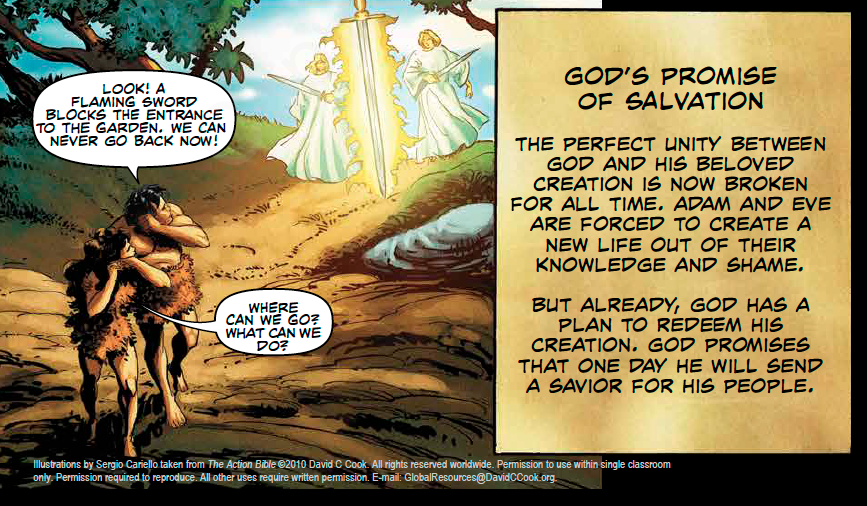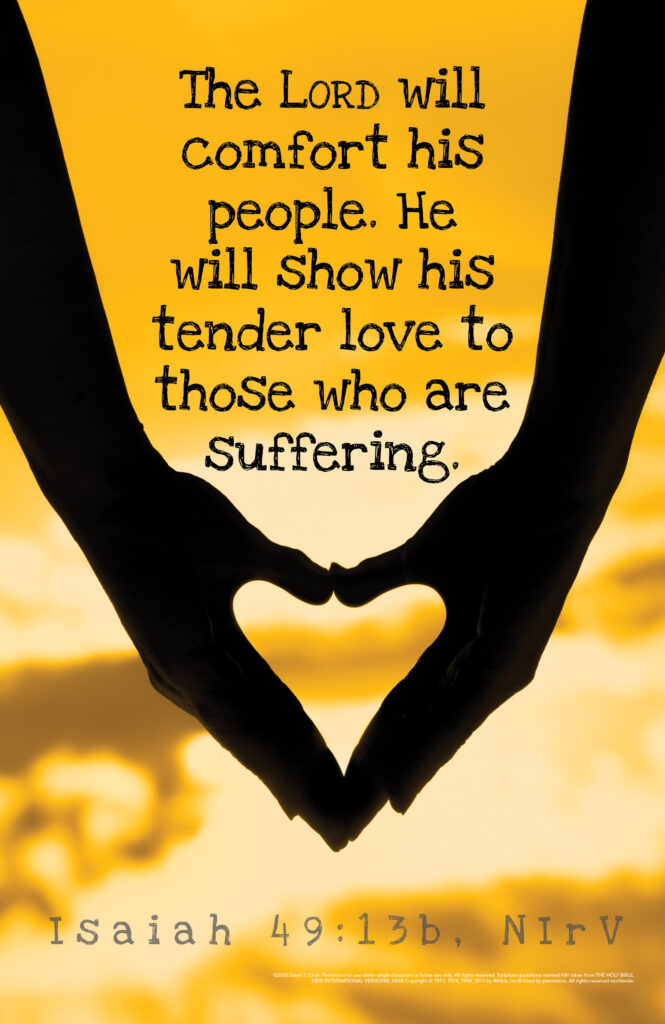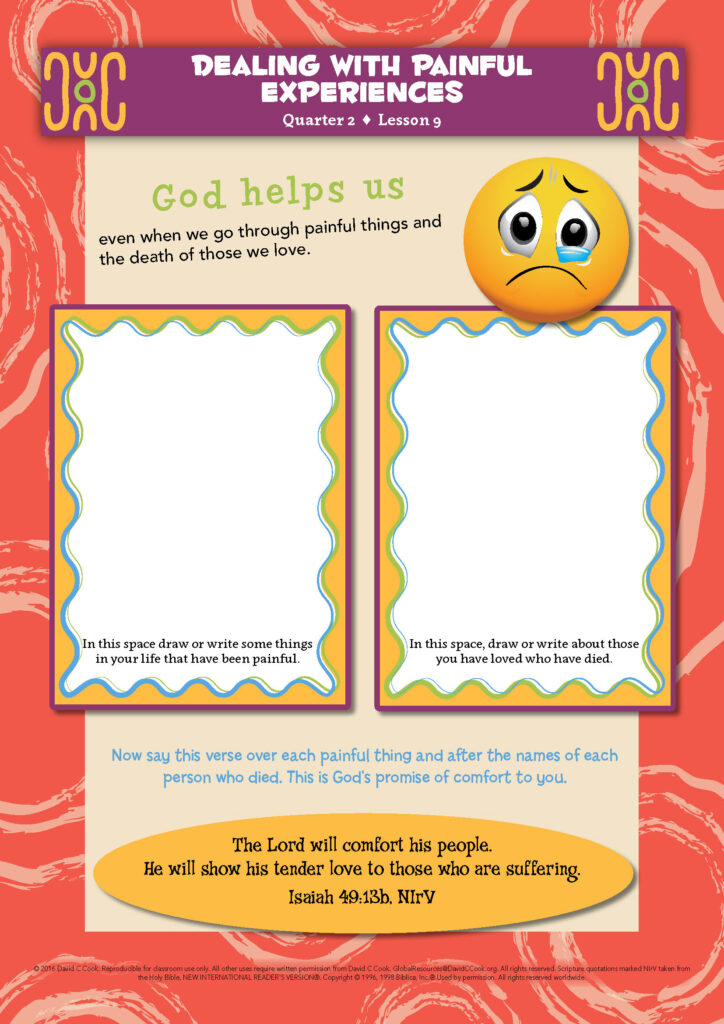During the lesson, the information for you to know is written in regular type, and what we suggest speaking or reading aloud to children is in bold. All resources for this lesson, including the Teacher Guide, Student Page, Family Connection Card, and other resources can be downloaded in a ZIP file by clicking on the following link:
In some lessons you will find "resource articles." These are articles written by experts from around the world to help equip you for your work with children and adolescents. Share them with parents or guardians if you consider it appropriate.
Jesus wept.
John 11:35
Two days after Jesus heard that His friend Lazarus was sick, He went to visit him. By the time Jesus arrived, Lazarus had already been dead four days. Jesus wept. Jesus, who is fully God and fully man, felt the deep pain of loss. He knows how it feels to lose someone you love.
As you prepare to teach children that God brings comfort to the brokenhearted, spend time reflecting on the losses and pain you have experienced. If feelings of sadness and pain resurface, invite God’s Spirit, our Comforter, into your grief. Sadness and grief are not ungodly. They are a part of being human.
Finally, invite God to use your pain to help others, starting with the children in your class. Jesus wants to meet them in their pain and give them hope, just as He did for you.
Let the families of your children know that this is the first of 4 lessons about difficult topics such as loss, pain, and grief. Encourage them to share openly with their children about a loss or painful experience they have gone through. How did they feel when it happened? How do they feel now?
Teacher Tip: If possible, email or text the Family Connection Card to the families of your students.
As your children enter class today, be sure to greet them in a way that shows them you care. This is especially important with this unit! Children need to feel safe in order to share hard things they have experienced.
Have children stand in a circle. You will read several statements. If a statement is true, ask the children to step into the middle of the circle. Before reading each new statement, have the children in the middle return to the big circle. Most or all of the children will step forward for the statements about pain, sickness, and death.
Have the class gather and sit down in your teaching area.
There were some statements that some of us had in common. But the last few statements about painful issues were the ones that all of us have in common. We will talk about these painful issues several times this month. The topics will be difficult. We will look at pain in our own lives, pain in the lives of people we love, and even the pain of that comes when someone we love dies.
Why are we going to look at such a sad part of our lives? Because it can be hard to let go of pain. God brings comfort to those who are sad and hurting. Many people know that Jesus wants to help them, but they are not able to let Him. Instead of healing, the pain only gets worse. If we do not deal with the pain that comes from sickness and death, we can never be totally healthy as children or adults.
Every human being experiences pain and death. But we do not talk about these things very often. The next few weeks, we will talk about pain that comes from the illness or the death of those we love.
For the next 2 questions, allow 3–4 different children to answer each one.
When God created the world, He made it perfect. He liked what He created. It was good. Remember how perfect the world was when God created Adam and Eve? We have learned what happened next. Adam and Eve sinned and everything changed.
Optional: If you are using The Action Bible, ask the children to read the story on pages 21–23.

Adam and Eve disobeyed the one rule God had given them. God disciplined them by sending them out of their beautiful garden. When they disobeyed, they sinned and broke the close friendship they had with God. They had to leave their home in the garden. They lost their close relationship with God and could no longer talk with Him face-to-face. For the first time, they had to work hard to survive. And, sadly, their physical bodies would not live forever. When they sinned, sickness and death also entered the world. Adam and Eve would eventually die. Let’s read a verse from the Bible about sin entering the world.
Read Romans 5:12 and other noted verses directly from your Bible.
Therefore, just as sin entered the world through one man, and death through sin, and in this way death came to all people, because all sinned.
Romans 5:12
Sin entered the world through Adam and Eve. Each of us sins, too, when we choose our own way instead of God’s way. God was sad when Adam and Eve sinned, but He still loved them. God also still loves us, even when we sin. Nothing will ever change His love for us!
In spite of Adam and Eve’s sin, God provided a happy ending for them and for us. He promised to provide a way to restore the friendship with Him again. He promised that He would send a Saviour. That Saviour is Jesus, God’s Son.
In this passage in his letter to the Romans, the apostle Paul was comparing Adam and Jesus—and the effect their lives had on others. Listen to what Paul wrote.
For if the many died by the trespass of the one man, how much more did God’s grace and the gift that came by the grace of the one man, Jesus Christ, overflow to the many!
Romans 5:15
When we love Jesus and accept God’s grace and the gift of salvation through Him, He promises to be with us forever—in this world and in heaven, after we die.
Over the next few weeks, we will talk about pain and death and how God helps us as we go through painful things—even the deaths of those we love.
Ask the children to think of some of the painful things they have experienced. Examples you can give them are: “My mother died.” “My father left.” “My auntie got sick.” As they think quietly, have them hold up 1 finger for each deep pain they have experienced. Next, have the children find partners. Those who are comfortable sharing can tell their partners about 1 or more of their pains. Children who do not want to share can simply hold up the appropriate number of fingers for their partners to see. Allow 5–7 minutes for this activity.
Gather the children back together. Invite anyone who would like to share about 1 of his painful experiences with the class to do so. If no one volunteers to share, that is okay. Tell them that if they want you to pray for them, they can come to you privately before they leave today and tell you what they were thinking of. They may also just tell you that they would like you to pray for them but not share exactly what the hurt is. Two of the most helpful comments you can make when a child shares privately are, “Thank you for sharing your pain with me so I can pray for you” and “I hurt with you, and so does Jesus.” Tell them that you will pray for them every day.
Teacher Tip: Make sure your class is a safe place for children to share their personal hurts and fears. Listen to their problems with compassion. Do not act shocked by anything the children confess or discuss. Be sensitive to how the children react to each other. Remind them to offer support and comfort to each other. No one should be teased when sharing her pain.
Optional Supplies:
Give each child several slips of paper. They can write or draw any pain they have experienced on them. Have them fold their slips over so no one can see what they have written. Collect the slips and explain that you will read every one of the slips and pray for each child every day for the next month, even though you do not know the name of the child who wrote the slip.
Be prepared to share a question you have, in case no one answers. Encourage the children to share their fears and doubts about suffering.
God wants us to trust Him with our honest questions. Even if you feel angry, frustrated, or confused with God, He still loves you. While no human has all the answers to all our questions, we can know for sure that God is still in charge. God wants what is best for each of us. He is sad about our pain and our grief over the deaths of people we love, but He can use what happens in our lives. One way He uses it is to make us more sensitive to Him and to the pain of other people.
Tell or read this story to illustrate how God can use the bad things that happen to us for good.
A mother had a healthy baby boy. The doctor told her she would never be able to have any more children. She was not sad that she would not have more children because she had a healthy baby boy. But 24 days after he was born, the baby got intestinal diarrhea and died. The mother cried and felt like her heart would break. She knew that her baby’s death was caused by germs. God did not cause the baby’s death. It was a result of sickness in the world.
For the rest of her life she felt sad that her baby had died. She never stopped missing him. But one day she asked God how He could use her baby’s death to bring glory to Him. He showed her she could help others. She ended up meeting dozens of other women who had also lost their babies. She talked to them about God’s love and how He wanted to help them heal from their pain. She prayed with each woman. Years later, she said, “I know God was with me when I lost my precious baby, and I also know He used me to help many other women because I understood their pain. God turned something awful into something He could use.”
Now listen to what happened to Paul, who wrote many of the books of the New Testament, including our verses from Romans. Paul was one of the first people God called to be a missionary. You might think he must have had a great life because God called him to do such an important job. But just because you love God does not mean that the hard things in life will not affect you. People who love God live in the same world as everyone else.
Paul spent time in prison. He was beaten and experienced shipwrecks. He almost drowned. He was robbed, betrayed, hungry and thirsty, and, in addition to all of that, he had what he called “a thorn in my flesh” (2 Corinthians 12:7). Many Bible scholars think this was a physical disability, perhaps something wrong with his eyesight.
God did not keep all these things from happening to him. Instead, God was with him in every situation. God used the difficult things Paul went through and comforted and encouraged him along the way. Pain and suffering come to everyone who lives on this planet. Christians are not spared from suffering. Pain is not imaginary. It is real and it hurts.
Both Paul and the mother whose baby died invited God to use them and their pain in the lives of others. This does not mean that they did not cry, feel sadness, or grieve. Instead, they invited God into their grieving. God comforted them and helped them point others to hope in Jesus through their painful experiences.
Even though we suffer and have pain, we can trust God to bring good out of it. Some pain in our lives happens just because we are human beings. As we go through pain we can grow even closer to Jesus as we rely on Him to help us get through the pain. Many times when people think back on hard times, they realize those were the times when they were closest to God. Times of suffering help us think about what is important in life.
God loves you very deeply. Doctors and counsellors have discovered something about suffering people who know that God comforts them in their pain. They are able to move through their pain and are healthier afterwards than those who focus on why they are suffering. Focusing on God and receiving His comfort helps them live happier lives.
I am going to read a Bible verse from Isaiah three times. The first time I read it, think about your own pain and ask God to comfort you with His love.
The Lord will comfort his people. He will show his tender love to those who are suffering.
Isaiah 49:13b, NIrV

Though this verse was originally written for the sake of the ancient people of Israel, it is also an encouragement for all people everywhere who have experienced pain and loss. As you listen to it a second time, think about someone you know who is sad or in emotional or physical pain. Ask God to show His tender love to her. Ask God what you can do to help her know God’s love personally.
Read Isaiah 49:13b again slowly.
I will read the verse one more time. If you can, say it with me. Think of it as a prayer thanking God that He is with you always and that He comforts you when you are hurting.
Read Isaiah 49:13b again slowly.
Optional: If you are using the Student Pages, the children can draw and write about their painful experiences.

Close the lesson by praying this blessing over the children:
Blessing: God’s love for you reaches higher than the heavens and deeper than the seas. May He comfort you and give you hope. And may He give you opportunities to point other people in pain to the hope and love of Jesus.
Since this is a difficult topic, end your class today by singing ”Blessed Be Your Name” together.
Life on Life ©2020 David C Cook. Reproducible for home or classroom use only. All other uses require written permission from David C Cook [email protected]. All rights reserved.